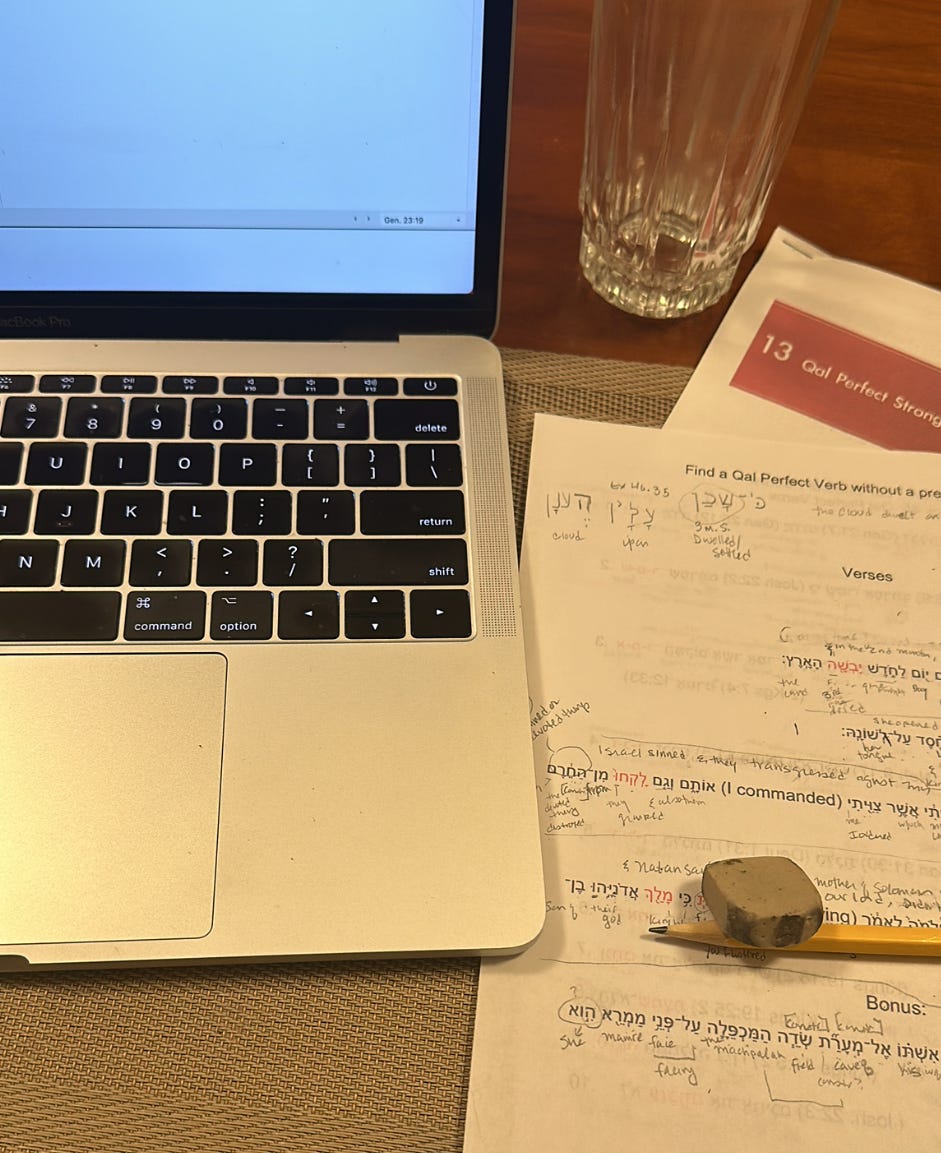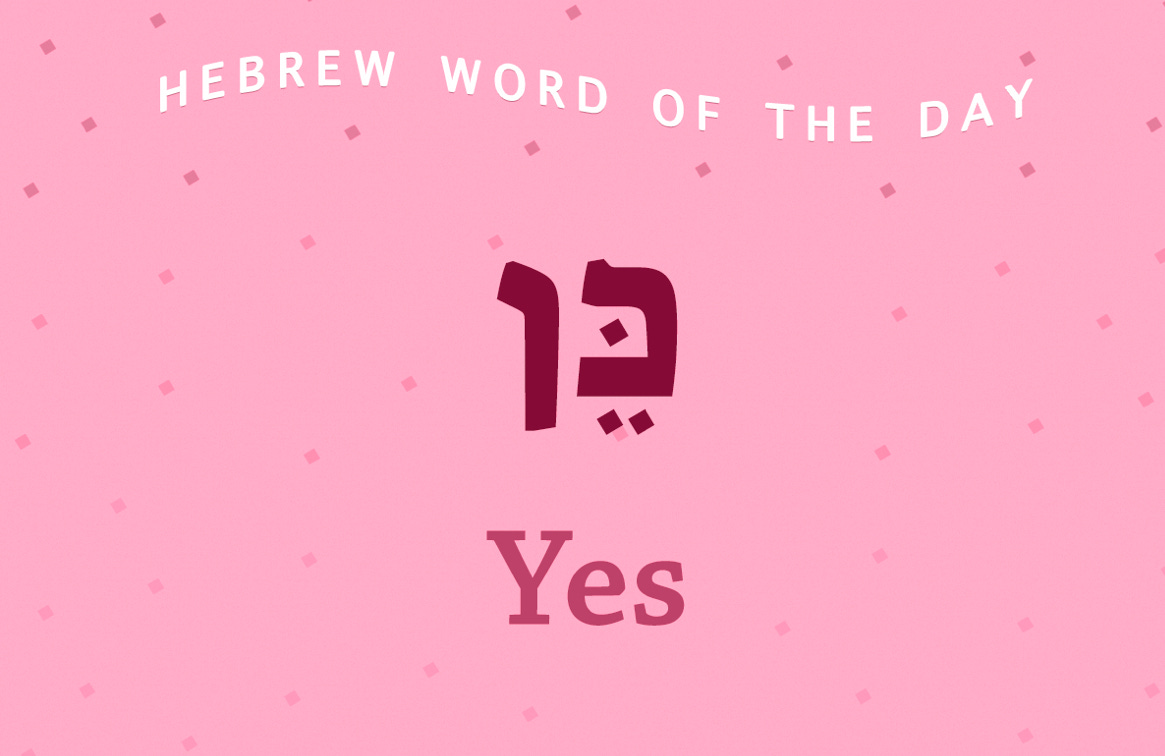Translating a story, one word at a time.
Welcome back to 'The Life of H: Sarah, Reimagined.' This poetry project was inspired, in large part, by pondering the meaning of one name: Sarah's
Back in January I enrolled in a year-long 4-level biblical Hebrew class, with the goal of doing my own translation of Sarah’s story.
Considering that I began with a stumbling ability to sound out Hebrew words with minimal comprehension, the idea that at the end of a year I’d be able to reach my goal was lofty, to say the least.

This week I’m celebrating the completion of Level 2 🎉!
And as proud as I am, I am still swimming in a sea of confusion as I confront increasingly complicated nuances of verb conjugations and multiplicity of meanings.
But our wise and patient teacher consoles us: Drip by drip, water can wear away a stone over the course of time, and so too will we learn biblical Hebrew — one drop, one word, at a time.
Word by word
In that spirit I subscribe to a “Hebrew Word of the Day” newsletter, which brings a vocabulary word and a little wisdom to my inbox each day.

Today’s word, ken, meaning yes came with this tidbit:
“Kishmo ken hu ("Like his name, so is he") is a biblical phrase for the Jewish idea that a person's name can illustrate their character.” from My Jewish Learning
This was a timely bit of inspiration as I sat down to write today’s post. It was the translation of one word, a name, that sparked my fascination with Sarah’s story, inspired the poems I’ve written in response to it, and fed my drive to learn to read and translate that story for myself.
That word, that name, was, of course: Sarah.
The name of the first Hebrew matriarch contains seeds of stories and deep roots that led me into its possible and surprising linguistic origins.
Here are just a few of the places that digging into Sarah’s name has brought me:
I first became intrigued by how both Sarah and Abraham were initiated into their spiritual calling with the insertion of one letter into each of their names: Sarai’s H elevated her from Sarai, meaning my princess, to Sarah, princess of a people or chieftain.
Then I learned that according to rabbinic lore, her name changes not once, but twice: As a child she was called Yiscah, meaning one who laughs. She then became Sarai, and eventually Sarah.
Digging deeper still, I discovered that the core letters SRH connect Sarah to gods and goddesses of her homeland in ancient Mesopotamia. Šaratu, for example, means Queen in Akkadian. And Sarah sounds like the name of the moon deity. (You can hear that word, meaning moon, pronounced and see it written in an ancient script, here.) Thus, some scholars and linguistic archeologists have posited that Sarah may have been a high priestess in the temple of the Moon, and may even have been regarded as an incarnation of a goddess.

Contemplating Her names
Many of my poems and posts in this series revolve around names and naming. Here are a few past poems, each of which contains an audio poem on the theme of Sarah’s name:
“Her Name Means,” a poem about my choice to be called by my Hebrew name, can be found in this post.
“Sarah with an H,” a poem about the letter that turned Sarai into Sarah, can be found in this post.
“Sarai No Longer,” a poem about her transition from Sarai to Sarah, can be found in this post.
Today’s poem: A dark twist in the story of a golden name
In (much) more recent times, Sarah and Abraham’s names took on an ominous association.
Today’s poem, “Compulsory Names for Jews,” incorporates the text of the Law on Alteration of Family and Personal Names, which was issued in Nazi Germany on Aug. 17, 1938. That edict required Jews with assimilated German first names to adopt the name Sarah (for women) and Abraham (for men) on official documents so they’d be easily identified as Jews.
I used the form of the erasure poem, in which the poet blocks out words from an existing text to create today’s poem. But in my poem I allowed the original text to bleed through the black stripes of redaction to allow the reader to experience the grim and haunting presence of the Nazi decree — which poetry can alter, but not erase.
Why is today’s poem behind a paywall? (and how to get around it)
Usually I share my poems as audio readings. That’s because if I share the full printed text with all 2,200 of you, my dear subscribers, those poems will be disqualified from publication in most journals.
But today’s poem is a visual one, whose meaning would be lost in an audio recording. That’s why I’ve tucked it behind a paywall, where it will be shared with fewer readers.
And yet, I don’t like holding things back from you. So, here’s a work-around:
Substack offers you the chance to use a one-time-only freebie so you can slip past the wall. Is that gaming the system? Some might say yes (ken). But I say: Go ahead and use that option, I don’t mind at all!
Then again if your choose to upgrade to paid, you’ll get lots more goodies, too. PLUS you’ll get a paid subscription (at no extra charge) to my other Substack publication, This Dream is a Poem.
If the regular subscription price doesn’t fit your budget, you can also Pay-What-You-Can here and receive the same benefits.
And now, for today’s poem:
Keep reading with a 7-day free trial
Subscribe to The Life of H to keep reading this post and get 7 days of free access to the full post archives.




